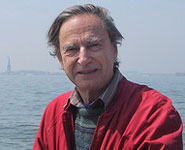Prior to his retirement he had been Reader in Ethology at the Department of Psychology (as it was then) through the 1970s and 80s, leading a research group studying social and reproductive behaviour in animals and setting up the innovative and popular Joint Honours Degree in Psychology and Zoology.
He had studied for his PhD at Cambridge in the 1950s under the leading animal behaviourists Robert Hinde and Bill Thorpe, investigating the ecological factors influencing social behaviour in weaver-birds. His view that ecology shaped social behaviour broke away from Nobel laureate Konrad Lorenz’s widely accepted idea that behaviour was species-specific and highly conserved over evolutionary time. John’s work added ‘ecology’ to ‘ethology’, and he is widely regarded as having introduced cross-species comparisons to the scientific toolkit of animal behaviour. His pioneering studies of primates as well as birds had a large influence in the growth of the fields now knows as behavioural ecology and socio-biology, and his academic ‘offspring’, both students and postdocs, themselves have had a big impact on the field. They include Robin Dunbar, now Director of the Institute of Cognitive and Evolutionary Anthropology of the University of Oxford; Richard Wrangham, Professor of Biological Anthropology at Harvard University; and the leading evolutionary psychologist Martin Daly, Professor of Psychology at McMaster University, Ontario. Tackling one of the biggest questions in psychology, his 1980 book “The Evolution of Human Consciousness” was also influential in stimulating a new wave of evolutionary approaches to this age-old problem.
By the start of the 1990s, his attention had shifted to human social behaviour, studying the polyandrous (‘multi-husband’) marriage system of the hill-tribes of Ladakh and interpreting this as a social adaptation to the harsh farming conditions in the Himalayas. However, with a long-standing personal interest in Buddhist philosophy, his research moved away from ecology towards studying the social and spiritual lives of these communities. Ultimately he also taught Western practitioners of Zen Buddhism and wrote several books on Buddhist philosophy and its relationship to Western humanism.
Dr Innes Cuthill, Professor of Behavioural Ecology
